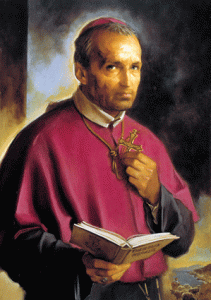 Alphonsus Liguori was the eldest of seven children and came from a noble family. He went to law school at the age of sixteen and became a distinguished lawyer. After a long period of discernment, he gave up his legal career and, against his father’s wishes, began his training for the priesthood. He was ordained in 1726, at the age of 30. He spent his first years as a priest with the homeless and marginalized youth of Naples. He founded “Evening Chapels” which were run by (and for) the young. The “Chapels” became centers of prayer, community, the Word of God, social activities, and education. At the time of St. Alphonsus’ death, there were 72 of these Chapels with over 10,000 active participants.
Alphonsus Liguori was the eldest of seven children and came from a noble family. He went to law school at the age of sixteen and became a distinguished lawyer. After a long period of discernment, he gave up his legal career and, against his father’s wishes, began his training for the priesthood. He was ordained in 1726, at the age of 30. He spent his first years as a priest with the homeless and marginalized youth of Naples. He founded “Evening Chapels” which were run by (and for) the young. The “Chapels” became centers of prayer, community, the Word of God, social activities, and education. At the time of St. Alphonsus’ death, there were 72 of these Chapels with over 10,000 active participants.
Later, St. Alphonsus left his family home to begin his missionary work in the interior regions of the Kingdom of Naples where he found people who were much poorer and more abandoned than any of the street children in Naples. In 1732, St. Alphonsus founded the Congregation of the Most Holy Redeemer (C.S.S.R., the Redemptorists). The congregation’s goal was to teach and preach in the slums of cities and other poor places. They also fought Jansenism, a very negative form of spirituality which created an exaggerated sense of sin, which deterred people from receiving the Eucharist.
St. Alphonsus was made a bishop late in his life, although he tried to turn down the appointment because he felt too old and too sick to care properly for the diocese. During this period he wrote sermons, books, and articles to encourage the devotion to the Blessed Sacrament and the Blessed Virgin Mary. He died on 1 August 1787. A lasting contribution to the Church has been through his book Moral Theology. This work was the fruit of his pastoral experience, his ability to respond to the practical questions posed by the faithful and from his contact with their everyday problems. He strongly opposed the sterile legalistic approach to morality and rejected the strict rigorism of the time, telling the supposed theological elites that they were quite out of touch with people’s ordinary lives. His system of moral theology was noted for its kind and thoughtful balance.
Saint Alphonsus wrote the Prayer of Spiritual Communion which we are presently using (in an adapted form): “My Jesus, I believe that you are present in the Most Holy Sacrament of the altar. I love you above all things, and I desire to receive you into my soul. Since I cannot at this moment receive you sacramentally, come at least spiritually into my heart. I embrace you as if you were already there and unite myself wholly to you. Never permit me to be separated from you or from your people. Amen.”

